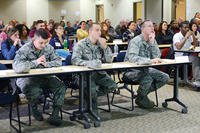Practical, hands-on laboratory work is important for all college students who want to become scientists—but, for many of them, such experiences are out of reach.
That's one of the reasons why every summer, our National Center for Toxicological Research (NCTR)—FDA's internationally acclaimed toxicological research center in Jefferson, Arkansas—hosts a special internship program for science students interested in toxicology research.
The 2014 program was exceptionally successful for both the students and the Center.
Applications poured in from more than 200 students pursuing a variety of majors in universities from coast-to-coast. The competition was intense, and the 21 selected students came from schools in 13 states. But they were all alike in two fundamental ways: they were top students, and were eager to hone their scientific skills in real FDA laboratories.
During their 10 weeks at NCTR, the students worked on projects varying from the development of bioinformatics and statistical methods for RNA sequencing data, to evaluating effects of silver nanoparticles in plastic food containers. They conducted in-vitro experiments; examined effects of nicotine treatment; gained lab experience in cell culture; and were trained in computational modeling or statistical programming.
Each student's experience was unique and addressed the student's interests.
The interns gave the program top grades. For example Claire Boyle, a graduate student from Florida State University, said about the lab work: "I like it a lot more than classes. There they tell you that you can do research once you get into the real world. I've never had an opportunity to do that before coming here [to NCTR], and that's the aspect of the program I like best. It's given me insight into what I want to do for the rest of my life!"
Luis Valencia, a senior from Texas A&M University, echoed similar praise. "This isn't some pointless classroom assignment; this is the FDA. Something you discover [in this lab] could save a life." He continued, "I'm having a great experience at NCTR. [My NCTR mentor] let me design my own experiment and helps me a lot. I'm already on my second trial and we're getting good results."
The internship program, which was partly funded by the FDA's Office of Minority Health, is one of the many ways NCTR reaches far and wide to strengthen the scientific foundations of our agency. We engage with scientists within FDA and across other government agencies, industry, and academia to develop scientific information that is vital for sound regulatory policy. We cooperate with colleagues abroad to advance international standardization of regulatory science. And we're mindful that all quest for knowledge starts with education.
If you are a science student interested in toxicology research, or if you know someone who is, it's not too early to consider the NCTR's 2015 internship program. To qualify for admission, a candidate must meet the GPA requirements and provide evidence of success in science courses. He or she will also need letters of recommendation and a personal statement describing his or her research interests.
If you believe you have what it takes, you could be among the select few chosen to join us in the summer of 2015. Applications are accepted throughout the month of February. We look forward to your application!
For more information about the program go to: Summer Student Research Program (NCTR)
For more information about the FDA Office of Minority Health go to: Minority Health
Nysia George, Ph.D., is the National Center for Toxicological Research's Intern Program Coordinator.
Tom Powers is the National Center for Toxicological Research's Communication Officer.





